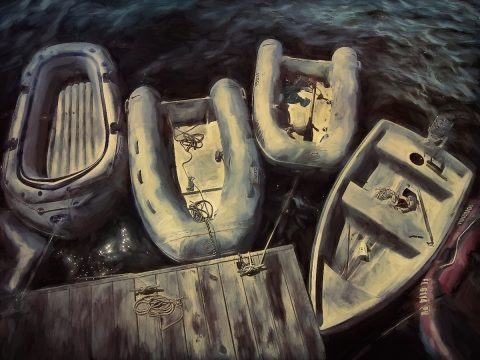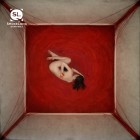What first inspired this story?
A lot of my writing starts with a single line that I don’t really know what to do with. This story started with the phrase ‘the Earth loosened its hold on us.’ I think I first wrote that down a few months after the news that gravitational waves had been proven, and came back to it later to develop the story. I’m interested in scientific phenomena, like gravity, that allows human life to exist on this planet even though we don’t really understand how all of those elements work. Or to be fair, even though I don’t fully understand it –science was never my strongest subject, but maybe that’s why I find a lot of it fascinating now.
There’s something really appealing and fun about stories that reimagine our world. Why do you think we’re drawn to stories that do this?
For me, it’s partly an interest in all the elements of the regular world that I don’t fully understand. Just trying to unravel how the real world works shows you what a fragile balance it is and how easily one small change in those elements would have created an entirely different world. I do find that I’m really drawn to apocalyptic stories – Emily St. John Mandel’s Station Eleven, Jose Saramago’s Blindness, Laura van den Berg’s Find Me, Peter Heller’s The Dog Stars, Margaret Atwood’s Oryx and Crake. Weirdly, I find these books to be really reassuring and hopeful. Post-apocalyptic stories always mean someone survived the apocalypse to tell another story, and it’s kind of nice to imagine there will still be something here after the end of the world.
The imagery in this story is so lovely: grass cuttings float like confetti, mashed potatoes hover like clouds, Aspirin rattles in its bottle. But not only is your imagery lovely, it is powerful. Nearly every detail contains a potential metaphor. For example, “Everything we’ve tried to contain is breaking free,” though referring to objects, also brings to mind a psychological or emotional “breaking free.” Can you speak to the process of writing a piece in which imagery carries the story?
Thank you! Honestly, I think it was an accident as much as anything else. I first imagined this as a prose poem, but around the 500-word mark, I realized the piece had gotten away from me a little bit. But because I started off that way, I was thinking more about imagery than characters or a plot.
Why did you choose to write this story in the first-person plural, instead of focusing on an individual character?
Since this started as an attempt at a prose poem, I just wasn’t thinking about individual characters. By the time I finished a draft, the ‘we’ voice just felt more natural. I’d always imagined the gravity reduction as a kind of global event, it ended up being more about the impact on human life in general and the ways we would all be experiencing this uncanny shift in reality at the same time.
How would your life change if suddenly the Earth had reduced gravity?
I strongly suspect I would hide in the basement with my family and be terrified to leave the house! But maybe not – the shift of gravity in this story was slight enough that parts of normal life could continue, but there’d be this constant fear as we went about daily life. Which might be more accurate – traumatic events or major changes always give us the sense that things will never be the same again. But we still return to ‘normal’ in the sense that we have to get on with day to day living: eating, sleeping, taking care of our families, going to work. Even if we’re doing all of those things with a very different awareness or view of the world around us.
What projects are you working on now?
I’m working on a couple other short pieces that are in some ways linked to the same themes as this story – I may work on putting together a chapbook of flash fiction. And of course, I have a novel in a drawer that I think needs one last revision.



 The core workshop of SmokeLong Fitness is all in writing, so you can take part from anywhere at anytime. We are excited about creating a supportive, consistent and structured environment for flash writers to work on their craft in a community. We are thrilled and proud to say that our workshop participants have won, placed, or been listed in every major flash competition. Community works.
The core workshop of SmokeLong Fitness is all in writing, so you can take part from anywhere at anytime. We are excited about creating a supportive, consistent and structured environment for flash writers to work on their craft in a community. We are thrilled and proud to say that our workshop participants have won, placed, or been listed in every major flash competition. Community works.